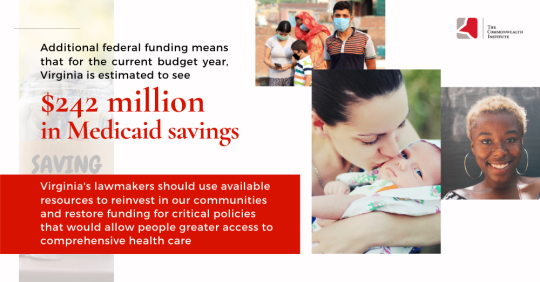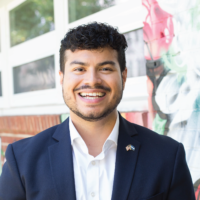September 8, 2020
After Saving Big on Medicaid, It’s Time for Lawmakers to Reinvest
Quality health care is essential to our well-being at any time and, in the midst of a pandemic, Virginia should be leveraging resources to make comprehensive health care even more accessible. Additional federal funding has resulted in savings for Virginia’s Medicaid program, which could be reinvested to further strengthen health care in Virginia. Unfortunately, the two-year budget proposed by Gov. Northam on Aug. 18, does not restore previously agreed upon funding for Virginia’s Medicaid program in addition to other critical public services, such as K-12 education and more.
Gov. Northam’s proposal also leaves $490 million in general funds unspent, effectively leaving money on the table at a time when families are struggling to meet their basic needs, including those related to health care. Now is not the time to delay access to critical health care services. With resources available, lawmakers should restore funding for essential oral and maternal health initiatives and end the draconian “40-quarter rule,” a barrier to comprehensive health coverage for lawfully present immigrants.
State Medicaid Savings During Pandemic
Additional federal funding for Virginia’s Medicaid program has saved the state hundreds of millions of dollars this calendar year due to provisions of the Families First Coronavirus Response Act (FFCRA). The bill increased the share that the federal government pays for Medicaid (i.e. the federal medical assistance percentage, or FMAP) by 6.2 percentage points during 2020, which directs more federal funds to states. State savings from this policy results in additional general funds dollars which legislators can use freely.
The increased federal match for Medicaid will result in general fund savings in Virginia of $331 million for the current fiscal year (FY21). Virginia could receive even more fiscal aid if the federal public health emergency is extended past December 31, 2020. In order to access this enhanced federal funding, states must agree not to disenroll members unless they move out of the state or voluntary disenroll. This promise to not terminate coverage during the health emergency is expected to cost the state $89.1 million during FY21. In total, this provision is projected to save the state $241.9 million in general funds. By freeing up general fund dollars, those savings could account for a large share of the $490 million in unappropriated funds.
Medicaid, which is a state/federal program, provides families with low incomes and people with disabilities an affordable option for comprehensive health coverage. This program has been critical in responding to the health needs of individuals during the COVID-19 pandemic. Since the declaration of a public health emergency by Gov. Northam, Virginia’s Medicaid program has enrolled 118,000 individuals.
Nearly half (47%) of those newly enrolled during the pandemic are through Medicaid expansion eligibility. Those enrolled through expansion eligibility have no general fund costs to the state due to a generous federal match (90%) and the remaining cost paid for by a tax on private acute hospitals.

An Opportunity To Reinvest
Several members of the Virginia House of Delegates have submitted amendments that would restore funding for critical policies that would allow more people to access Medicaid coverage, keep their coverage for longer, and improve the services they can access.
Lawmakers should choose to make a portion of the $490 million in unspent funds available to:
- Restore funding to remove a barrier to health care, known as the “40-quarter rule”, allowing more lawfully present immigrants to be eligible for Medicaid ($4.5 million). Long-standing barriers to health care has contributed to the pandemic having a disparate and devastating impact on immigrant communities in Virginia. Access to basic health coverage is vital, and there is no better time to connect more people to health care than in the middle of a pandemic. Delegates Carroll Foy, Samirah, and Sickles have each submitted budget amendments to include this funding in the state budget.
- Restore funding to allow more mothers to access health coverage for a full year postpartum ($3.2 million). Currently, Medicaid for pregnant women ends 60 days after birth for women whose income is too high to qualify for Medicaid expansion coverage and yet, experts agree that the risks associated with childbirth often extend long after 60 days. Delegates Sickles and Willet have each submitted budget amendments to include this funding in the state budget.
- Appropriate funding for a home visiting demonstration project in 2022 ($3.6 million). This scaled-down version of a previously approved home visiting program would focus on providing Medicaid-eligible pregnant women with home visiting services to improve maternal and infant health outcomes and reduce health disparities. Home visiting programs for new parents promote healthy birth outcomes, enhance school readiness, prevent child abuse, and improve family self-sufficiency. Delegate Aird has submitted a budget amendment to include this funding in the state budget.
- Restore funding for a comprehensive dental benefit for adults enrolled in Medicaid ($34 million). Those without dental coverage identify cost as the biggest barrier to getting access and have few options. Over half of the 19,000 ER visits for dental concerns by people enrolled in Medicaid in 2018 were for “non-traumatic dental conditions” like toothaches and loose teeth. Preventive dental care will reduce costly ER visits and improve overall health.
The Virginia General Assembly should use all available resources to restore funding to these important health priorities. In addition to the $490 million in unspent general funds, the Northam Administration has also chosen to not tap into the state “rainy day” fund or revenue reserves which total roughly $1 billion and are meant to be used during times of fiscal distress such as the current economic downturn. Virginia has an additional $241.9 million in general funds during the current fiscal year as a result of federal actions to bolster Medicaid funding. It’s time to reinvest a small portion of that money or unlock state reserves to make sure more families can access comprehensive health coverage and services.
Category:
Health Care
